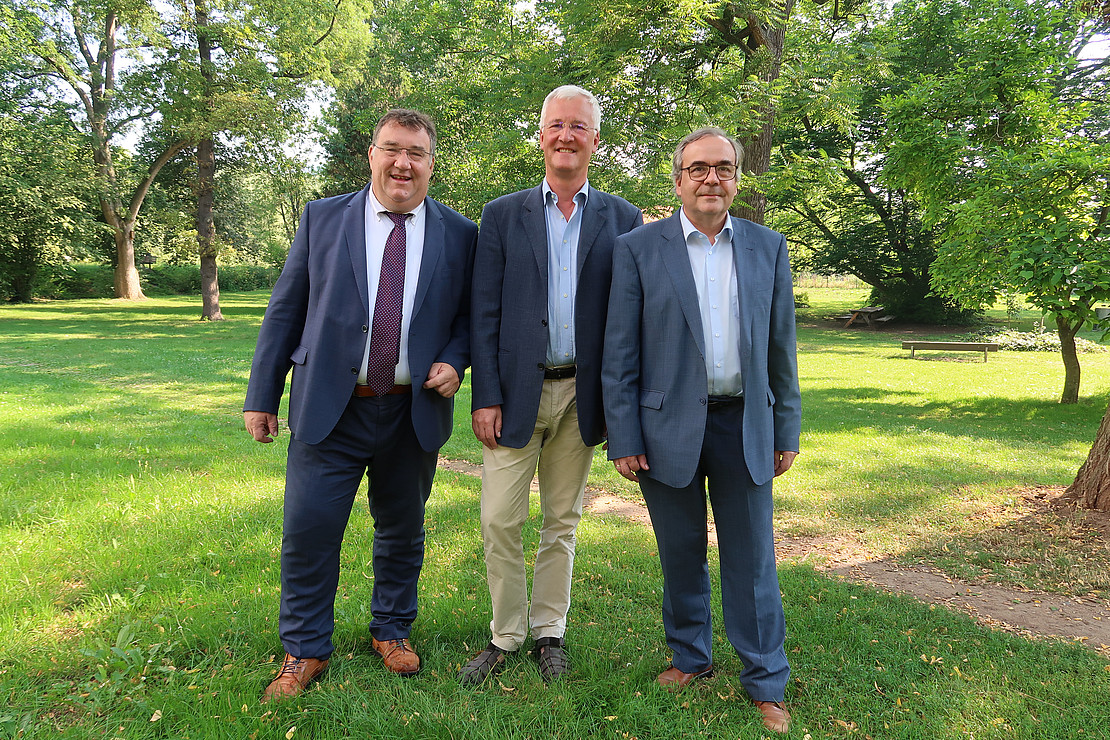This page contains automatically translated content.
Mark Weinmeister visits biomass utilization project
 Image: University of Kassel.
Image: University of Kassel.At the Department of Ecological Agricultural Sciences in Witzenhausen, the State Secretary visited the RE-DIRECT project ("Regional Development and Integration of unused biomass wastes as Resources for Circular products and economic Transformation"). It is intended to help solve disposal problems and at the same time achieve greater independence from unsustainably produced imported products. Eleven partners from Belgium, Germany, France, Ireland and the United Kingdom are involved in the project and plan to implement the approach in five urban, semi-urban and rural regions in these countries.
Prof. Dr. Michael Wachendorf is working to process biomass, carbonize it and use the resulting biochar. "Waste is often seen as dirt. But properly treated waste is a valuable source of material," said State Secretary Mark Weinmeister during his visit. "To do that, we need the right technologies." However, he said, there are ethical issues to consider when using agricultural bioenergy sources. "Tank or plate - this competition for use of bioenergy sources with food has been hotly debated," Weinmeister said.
This is where the project of Prof. Dr. Michael Wachendorf and his team comes in. "Every year, several million tons of biomass are thrown away. Particularly in urban municipalities, this means an enormous personnel and financial effort for the public waste management authorities," Wachendorf explained. In addition, green cuttings, mown grass or leaves, for example, are often heavily contaminated and very inconsistent in their composition. The aim of RE-DIRECT is to process this type of biomass, carbonize it and activate the resulting biochar. Through this treatment, the project also contributes to the large-scale removal of trace pollutants from municipal wastewater.
The President of the University of Kassel, Prof. Dr. Reiner Finkeldey, emphasized: "The EU funding is very important for the University of Kassel: researchers like Professor Wachendorf are excellently networked and can thus work on innovative issues in an international network. At the same time, the project benefits from our university's extensive experience in sustainability research and in cooperation with municipalities and companies. RE-DIRECT stands for the university's claim to bring scientific results into practice."
The project also promotes the economy in the participating regions. For example, plans call for the development of an urban biomass conversion center for biochar and activated carbon production in Germany and a small conversion plant in Wales. "This will create and secure jobs," said State Secretary Weinmeister. He added that it is also of great importance that innovative product and value chains are created and supported in the project regions as part of RE-DIRECT. "This project is therefore exemplary for the positive impact of European funding in Hesse," the State Secretary for Europe emphasized in conclusion.
Contact:
Prof. Dr. Michael Wachendorf
University of Kassel
Department: Grassland Science and Renewable Resources
Tel.: +49 561 804-1334
E-mail: mwach@uni-kassel.de